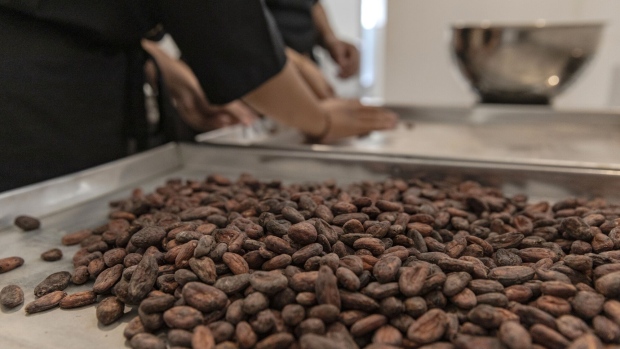May 2, 2024
Cocoa Slumps Again as Buyers Hold Back in Troubled Market
, Bloomberg News

(Bloomberg) -- Cocoa prices slumped again, extending a week of extreme volatility as liquidity dries up and buyers hold back from purchasing beans.
Futures in New York slid as much as 9.3% to the lowest since mid-March, before paring some losses. Prices are now about 30% lower than a record high set two weeks ago. Moves have also been more erratic as a liquidity crunch upended the market after it became more expensive for traders to maintain their positions.
Poor harvests in West Africa have left the world facing a third year of shortages, driving rapid price gains in recent months. That raised chocolate costs and stressed companies and traders, who have scrambled to secure beans while also being wary of getting burned by the volatile market.
The cash crunch is now forcing traders to delay purchases from the top producers, Bloomberg reported Wednesday. Buying more physical cocoa would require them to hedge their purchases in the futures market, just as the spike in volatility forces them to put up more money to cover margin calls.
“Indications that commercial firms are delaying some of their purchases of West African cocoa until next season has pressured the cocoa market,” the Hightower Report said.
Futures that approached $12,000 a ton last month have since slid to near $7,500, a pullback that could offer some relief to buyers.
Why Cocoa Prices Spiked, What It Means for Consumers: QuickTake
For now, the market is struggling with a lull in trading. Cocoa’s wild run this year means traders have had to come up with more money to pay margin calls, forcing them to close out positions. Aggregate open interest in New York cocoa, or the number of outstanding contracts, has fallen to the lowest since 2011, exchange data compiled by Bloomberg show.
“There is no liquidity in the market and trading few lots can move the market one way,” said Steve Wateridge, head of research at Tropical Research Services. “We know the situation of the current crop but there is still uncertainty over the next season.”
There are signs the supply situation may improve. Rains in West Africa could aid the upcoming mid-crop harvest, and Ivory Coast and Ghana have raised the price paid to farmers in a bid to entice more beans back to the market.
In other softs, the coffee market also saw big declines, with robusta futures sinking as much as 7.9% in London. Prices had reached a fresh high late last month in data going back to 2008. Speculators are exiting positions, and the move has “offered the commercial sector an opportunity to participate after weeks on the side lines,” Alex Boughton, a soft commodities broker at Sucden Financial, said in a Thursday note.
Coffee and cocoa have been “heavily overbought,” said Tristan Fletcher, chief executive officer at ChAI, a platform that uses AI to analyze commodity markets. “There’s been steady profit taking.”
--With assistance from Ilena Peng.
©2024 Bloomberg L.P.






